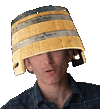Ok, lets write some about a few of the games in the list.
Thief, Thief 2 and Thief Deadly Shadows:
The games has a combat system, a stealth system and a few other systems. Of note is the physics which is very elaborate, but I wish there were more items to pickup/interact with. The game allows you to stack crates to make staircases, this in combination with mantling and rope arrows (climbing gloves in Deadly Shadows) allows the player to even reach places that developers didn't intend for you to find. In many missions in Thief & Thief 2 you can get up on the roof of a building and many times your footsteps will be silent (the developers didn't think you'd get there so they didn't put any noise on that surface). On the harder difficulties you can't kill anyone, but if you cause infighting between e.g. zombies and hammerites, then it doesn't count. Sometimes you trick enemies to suicide (drowning or falling from a height) but this might count as a kill, can't remember. There are always multiple paths through a level. The game essentially presents you with situations and gives you a toolbox to deal with them as you see fit.
System Shock 1:
The game has systems for combat, hacking and I guess maybe there is a basic stealth system as well. Enemies have different weaknesses, so it's helpful but not necessary to use different weapons against them. There's a physics system which mostly comes into play when using grenades. There's also the gun that shoots rubber bullets that you can shoot mines without triggering them, which is very useful at least one in the game (I guess I have to replay the game and try to find more uses for it). There are alternate paths through the levels and most of the levels of the game are open from the beginng.
System Shock 2:
The game has combat, stealth and simple RPG mechanics. The choices in how you approach any situation in this game are many, the toolbox is very big. The stealth system is very basic, focusing on sound and unlike combat you cannot increase your sneaking capabilities. There is a physics system but I feel it's underused (unless I've missed something?). That said, you are able crush robots by lowering a lift onto them, which is very satisfying (but requires excellent timing). If you're skilled, you can get enemies to hurt eachother, but they won't infight AFAIK.
Deus Ex:
The game has combat, stealth and simple RPG mechanics. There is also a dialogue system so you can talk your way into solving situations at times. The physics system is extensive and staircase building is more fun than ever. There's no mantling though, what a shame. The game is incredibly reactive, at least in the beginning it feels like every choice you make has a consequence. A problem here is that you easily could get all the good augmentations and just forget about the terrible ones, meaning that most builds end up looking exactly the same. But I guess different builds aren't the focus of the game.
Deus Ex Invisible War:
The game has combat, stealth and some barebones RPG mechanics. DEIW gets a lot of criticisms and much of it is valid, but I still feel I need to defend at least the decision to limit inventory and augmentation slots: you can't have all the good augmentations and you can't carry around all the weapons you find, you have to choose between several good choices. The physics system is extensive, albeit the physics are quite "wonky" at times (ragdolls anyone?). That said, just like in the Thief games you can easily get into places where the developer didn't intend you to be.
That's it for now. I guess next time I'll post something about Prey 2017 and Dishonored, but that will be for another day...
TLDR: I write "system", "situation" and "toolbox" several times.











